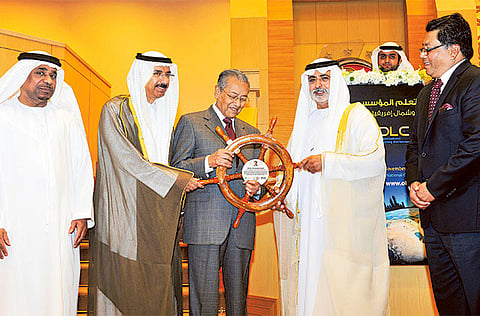Futuristic perspective guides UAE, Mahathir Mohammad says
Mutual cooperation of GCC remarkable like Asean, ex-PM of Malaysia says

Abu Dhabi: A futuristic perspective guided the UAE’s march towards success, Dr Mahathir Mohammad, former Prime Minister of Malaysia, said here on Sunday.
“The UAE had sent large numbers of young people for higher education abroad. When they returned after gaining the necessary learning and experience, their services were utilised for upgrading the living standards of the people,” he said. The UAE believed in the dictum that learning had the capacity to improve the quality of life at all levels, he added.
The former prime minister was answering questions from the audience after delivering the keynote address at the third Organisational Learning Conference Mena 2014 held under the patronage of Shaikh Hazza Bin Zayed Al Nahyan, UAE National Security Adviser and Chairman of the Emirates Identity Authority.
The mutual help and cooperation extended among the Gulf Cooperation Council (GCC) states is remarkable, Mohammad said.
This level of mutual cooperation helped resolve differences without snowballing into pestering conflicts, he said.
Comparing the GCC experience to that of the Association of South East Asian Nations (Asean), Mohammad said: “In the case of the UAE, a salient feature of its history was that it had sought out models of governance from across the world and picked up those models that suited its requirements in various spheres. This is also eminently comparable to the experience of the Asean.”
The two-day conference, organised by the Emirates Identity Authority, kicked off on Sunday in the presence of Shaikh Nahyan Bin Mubarak Al Nahyan, UAE Minister of Culture, Youth and Social Development, and Mohammad Al Murr, Speaker of the Federal National Council.
While elaborating on the Malaysian experience, Dr Mohammad said Japan’s post-war recovery was due to close relation between the government and the private sector. “We saw nothing wrong in the good relation between government and the private sector. Accordingly, we adopted Japan’s policy and call ourselves Malaysia Incorporated,” he said.
“A feature that Malaysia learnt from socialist countries is development planning. Each plan covers a period of five years and money for development projects come mainly from taxes collected by the treasury and, in some cases, loans from commercial banks. Malaysia never received financial aid from powerful countries. This prevents Malaysia from being put under the influence of foreign countries,” he said.
Mosabah Al Mesmari, Chairman of the Administrative Steering Committee and Executive Director of Human Resources and Support Services at the Emirates Identity Authority, said during his speech that in the unprecedented contest for global pre-eminence among nations, government organisations had to double their efforts toward progress and development though organisational learning.
Shaikh Nahyan honoured Juma Al Majid, Chairman of the Juma Al Majid Centre for Culture and Heritage, by conferring on him the Organisational Learning Personality of the Year for his contributions and efforts in supporting the spheres of education and learning in the country. The awardee’s grandson, Abdullah Khalid Juma Al Majid, accepted the award on behalf of his grandfather. Shaikh Nahyan also honoured Dr Mahathir Mohammad with the Life Time Achievement Award in recognition of his contributions to encouraging and promoting organisational learning.



